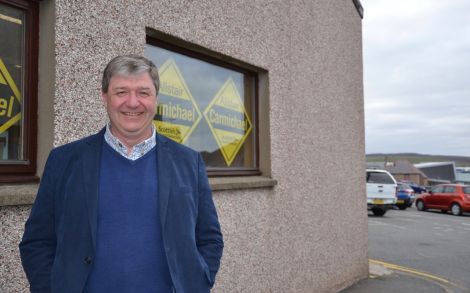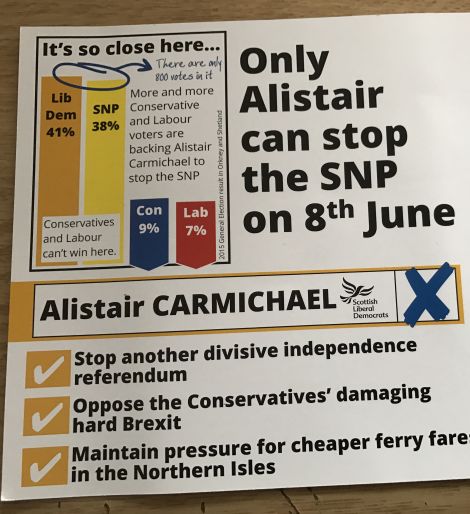Politics / Carmichael: people on doorsteps more concerned about second indyref than Brexit
OPPOSITION to a second referendum on Scottish independence has been a bigger issue than concern about Brexit on doorsteps in Shetland and Orkney, according to Liberal Democrat MP Alistair Carmichael.
Carmichael, who is defending an 817-vote majority in a seat he has held since 2001, said he expected a “close contest” with SNP candidate Miriam Brett and said it was “one that I am fighting hard to win”.
Liberal Democrat leaflets are focusing heavily on stopping “another divisive independence referendum”, along with opposing a damaging “hard Brexit” and keeping up the pressure for cheaper ferry fares in the Northern Isles.
SNP politicians, including Brett, are focusing their campaign on opposing Conservative-imposed austerity measures at Westminster and challenging the UK Government’s approach to leaving the EU.
But speaking from his Lerwick campaign office in what used to be the Robinson and Peterson electrical shop, next to the Great Wall restaurant, Carmichael said he expected the prospect of another referendum to feature heavily.
“Knocking doors, the issue that comes up time and again is not Brexit, it is the possibility of a second independence referendum, and for the SNP that’s an enormous negative,” he tells Shetland News.
“There is very little support for the idea, increasingly not just amongst those who voted No in 2014, but amongst a significant number of those who voted Yes. You come across a lot of people whose view is that it was said to be ‘once in a generation’ and that’s what it ought to mean.”
Brett has pledged to run a positive campaign and won’t seek to make capital out of the government memo leak Carmichael became embroiled in two years ago. Instead she has vowed to hold him to account for the five years his party spent in partnership with the Tories.
Become a member of Shetland News
Carmichael says: “I think a healthy, vigorous debate – one which doesn’t get overly personalised – is good for politics. I’m happy to be held to account, that’s what politics is all about.
“People will see the things we held the Conservatives back from doing, things like for example the cuts in tax credits. The Conservatives on their own would have gone much faster, much deeper, and with none of the protections for the poor and vulnerable that we insisted were put in place.
“You can now see that because they’ve done it – that great line from David Cameron that he would govern like a true Conservative but for the Liberal Democrats has now been seen to be absolutely true.
“There was an absolute necessity to get the public finances back in order. When your deficit is running in excess of 12 per cent of your GDP, you know that you’ve got an unsustainable situation, and you can’t just wish that away.
“I think the time to be held accountable for the coalition years was probably in 2015, but I’m not going to try and avoid any challenge on that point.”
He points out that the SNP has been in government north of the border for a decade, and he sees numerous areas where the party’s actions “have not helped tackle the problems of poverty and inequality”.
Carmichael highlights changes to the board of Highlands and Islands Enterprise (HIE) as a “classic” example of an SNP belief in one-size-fits-all solutions throughout Scotland.
“HIE was one of the big success stories, but it has now been absolutely filleted by a nationalist determination to control everything from Edinburgh,” he said. “It was the embedding of that economic development activity in the communities that made that so successful, and that has been absolutely trashed.”
He points to the creation of emergency call centres and a single police force as other examples of ”a centralising instinct that seems to be within the nationalist DNA and which have left us with a poorer quality of service”.
If elected, Brett has pledged to work with party colleagues to ensure the promised fare cuts and funding boost for inter-island ferries are delivered.
But Carmichael puts the failure to address those twin travel issues for a decade down to a “lack of political attention” that leaves Shetlanders and Orcadians feeling a “continuing injustice” when other parts of Scotland have already benefited from improved deals.
“Reliable and affordable transport links underpin just about everything that an island community is going to try to do,” he says. “Get transport right, and so many other things – healthcare, education, economic development – all fall into place.”
He refers back to Tavish Scott’s introduction of the Air Discount Scheme (ADS) as Scottish transport minister in 2006.
“Can you imagine the response if Tavish had said ‘well, I’m only going to introduce the ADS for communities in the Northern Isles and not in the Western Isles’? And rightly so – it would have been scandalous, and this is no less scandalous. We were promised last year that the fares would be cut and they weren’t.”
The Liberal Democrats and the SNP have both strongly opposed Brexit and the government’s handling of the issue since last year’s 52-48 referendum to leave the EU.
With many fishermen eager to get out in order to escape the clutches of the hated Common Fisheries Policy (CFP), does he fear losing those votes, perhaps to the Conservative candidate Jamie Halcro-Johnston, or UKIP’s Robert Smith?
“I think the issues surrounding fishing are more nuanced than the wider Brexit debate,” he responds. “People have always known my views and the views of my party when it came to the EU.
“They’ve also always known that I believe that the CFP was a disaster for the industry, I’ve never made any secret of my views on that.”
He wants to see all parties undertake not to “trade off our fishing rights for other areas of policy” during Brexit negotiations so the industry can be assured that “they would not be regarded, as they were by the [Edward] Heath government in the 1970s, as being expendable”.
Carmichael also notes reluctance among some within the SNP to commit to re-entering the EU as an independent Scotland “because something in the region of a third of those, we believe, who voted for independence also voted to leave the EU”.
He says such individuals showed “at least a politically consistent reasoning – if it is so wrong for Scotland to have to share her sovereignty with England, Wales and Northern Ireland, then I don’t know where the logic of wanting to share it with 27 continental European nations comes from.”
While he is keen to see power “pushed as far down to the community as possible”, that certainly doesn’t extend to supporting the aspirations of full-blown independence harboured by the likes of Stuart Hill and Wir Shetland.
Asked what he makes of Hill’s decision to stand, Carmichael is unable to resist a chuckle: “If he pays his deposit and gets the necessary signatures then he is entitled to be a candidate!”
This will be the first contest Carmichael has faced where there are female candidates – Labour’s Robina Barton joining Brett on the ballot paper as the first women to stand for the Northern Isles seat in 20 years.
Carmichael says he welcomes that development: “Yes, I think it’s good. All my life I have believed in having a more diverse politics… a mix of ages, a balance between genders, and a better mix of people from different social backgrounds.”
He adds: “it’s only part of the story, though. Politics is … more about what you do rather than who does it.”
Become a member of Shetland News
Shetland News is asking its readers to consider paying for membership to get additional perks:
- Removal of third-party ads;
- Bookmark posts to read later;
- Exclusive curated weekly newsletter;
- Hide membership messages;
- Comments open for discussion.
If you appreciate what we do and feel strongly about impartial local journalism, then please become a member of Shetland News by either making a single payment, or setting up a monthly, quarterly or yearly subscription.

































































